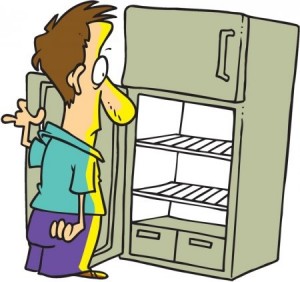You know when you’ve finished watching a movie/TV show or reading a novel, only to suddenly realize hours later that there was something odd about the plot? Well, what you experienced was a trope known as Fridge Logic, that peculiarity in a story that only hits you in a moment of idle thinking. It’s an interesting concept with which I’m becoming increasingly familiar, so today’s creative writing post briefly covers what it is and what it means for fiction writers. Enjoy!
Why a fridge?

Huh, empty. Like the hotel room in that– Wait a minute…
No, this trope doesn’t necessarily have to do with an actual refrigerator. According to TV Tropes, the term “fridge logic” can technically be traced back to Alfred Hitchcock, who once referred to a particular scene in his film Vertigo as an “icebox scene”. In the words of the director, it’s the kind of scene that “hits you after you’ve gone home and start pulling cold chicken out of the icebox”. Basically, Fridge Logic refers to a special kind of plot hole that you don’t notice at first because you were so caught up in the story that you didn’t bother to think about consistency at the time.
So what does this mean for you as a writer? It means that no matter how well you try to get away with a plot hole in your work, anyone anywhere at any time is bound to find it. Of course, how much that really matters is a subject for another time.
The Other Sides of Fridge Logic
That moment of clarity that hits you at the fridge doesn’t always have to be a bad thing. Sometimes what you realize is the cleverness embedded in a certain story element. This is known as Fridge Brilliance. It usually refers to a part of a story that you didn’t care for at first, only to come to appreciate it after you’ve finally recognized the true meaning behind it. And that, in my opinion, is pretty darn cool.
Another form of Fridge Logic covers the other side of the spectrum, when something you didn’t really notice at first becomes terrifying in hindsight. This is referred to as Fridge Horror. As noted on its TV Tropes page, there are two kinds of Fridge Horror: the horrifying story elements that went over our heads as kids but that have become blatantly obvious to us as adults (Frozen-By-Time), and those that reveal themselves after we take the time to really think about their implications beyond the immediate story (Quickthaw). Look for these at your own risk: remember, anything awful you see in a beloved work of fiction cannot be unseen!
Fridge Logic has the obvious risk of slightly taking away from an otherwise good story, but you can’t deny that it can be tons of fun to discuss once you’ve experienced it. Plot holes should usually be avoided altogether, but if you absolutely must include some, try to hide them well enough that they only become clear in hindsight. At least then you’ll be giving your readers something extra to discuss after your story is over! Good luck!
Have you ever experienced Fridge Logic before? What sorts of plot holes have you found in your favorite works of fiction?


Fridge Logic! Love it=)
So do I! Thanks for reading! 🙂
Loved this explanation and usually only experience it after a show full of plot holes I am aware of at the time but realize they get worse the more I put it all together! If I’ve loved a show I generally overlook any plot holes during or after watching!